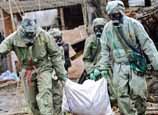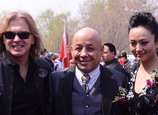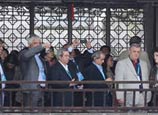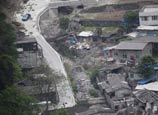
YA'AN CITY, Sichuan, April 25 (Xinhua) -- A few days after the powerful earthquake that hit southwest China's Sichuan Province on Saturday, Luo Yuying risked life and limb to retrieve belongings from her damaged home.
Any minor aftershock could have collapsed the ramshackle house, whose tiled roof was only supported by a few wood poles and cracked walls.
But the tiny, bow-backed Luo could be seen repeatedly trotting in and out of the ruins in Lushan County of Sichuan's Ya'an City, moving what she found to safety.
The items that she risked her life to protect included a ragged cotton quilt, several dusty woks and two worn-out pillows. "They still work," said Luo. "It's a waste to throw away valuable things."
She could be a worthy emblem of fragile life in the under-developed region. The 7.0-magnitude natural disaster which hit the earthquake-vulnerable province six days ago has given many people a rare glimpse of Chinese rural existence, highlighting the fact that the world's second-largest economy is still far from its revitalization goal.
It is believed that many other similar rural regions of China would be equally susceptible to natural disasters if they are not strengthened -- physically and economically.
Luo's family is grindingly poor. Its meager income comes from her 62-year-old son's employment in Nanjing, an eastern city some 1,500 km away from his home, and her daughter-in-law and granddaughter-in-law, both of whom grow rice on a patch of land in Gucheng, a little village in Ya'an.
The quake has left a confirmed 193 people dead and over 12,200 injured as of Thursday morning.
Many rural dwellers, like Luo, have been returning to their damaged houses to fetch what was left intact, ranging from cupboards, refrigerators, to pickle jars and mattresses.
In Lushan, the epicenter, Zhang Yukun, with a crippled leg and a blind eye, trudges every day from the relief tent camp he now dwells in to his damaged house half way up the hill, just to make sure the cow, pigs and chicken he raised are still there.
The 80-year-old man, who has always insisted on keeping his animals in sight, slept on a couple of wood panels outside his home the night after the earthquake, turning a deaf ear to the rescuers' warnings.
"They are everything I have now," he said of his precious livestock.
In Lushan's Taiping Township, rescuers helped an old couple move two pigs from a ramshackle pigpen.
"The couple were so glad," said Liu Xuancai, vice head of the rescue crew. "They kept expressing their gratitude to the Communist Party of China, the rescuers and soldiers."
Ten years after the launch of Sichuan's poverty-reduction initiatives, 3.4 million people are still living under the poverty line in the province.
In Ya'an, where the three worst-hit counties of Lushan, Baoxing and Tianquan are located, 15 percent of the population subsist on less than 1 U.S. dollar a day.
Although almost every county seat around China now boasts smartly paved roads, decent thoroughfares are still financially out of the reach of this region. Rainfall has made the muddy lanes a nightmare for the relief vehicles needing to gain access following the earthquake.
Xinhua reporters said most collapsed houses in Lushan were old ones constructed from wood and bricks. Some could be dated as far back as the 1960s and have not been properly maintained.
Earthquake experts believe that had the villagers had money to rebuild and maintain their houses, less damage and fewer casualties would have been reported in Saturday's aftermath.
In Lushan's Longmen Township, 99 percent of the houses collapsed in the disaster.
It costs at least 200,000 yuan (31,000 U.S. dollars) to build a two-story house in Longmen, probably another 100,000 yuan for the decoration and furniture, according to Luo Guanghui, a high-school teacher in the township's Wuxing Village.
"Even for a family where two young men go out to work in big cities, it takes at least five years to earn enough money," he said.
Official statistics show that the average annual income for a rural resident in Ya'an added up to only 6,200 yuan in 2011.
Looking for better pay, many young laborers have migrated to economically booming cities, mostly Chengdu, Sichuan's capital, and the neighboring municipality of Chongqing.
The labor flow has left the population of Ya'an villages mainly composed of women, children and the elderly, all of whom are much more vulnerable and needy in the earthquake.
Many Chinese believe the huge damage to roads and houses and severe shortage of water and power supplies in the quake-affected region have to some extent reflected the insufficient and low-quality infrastructure of the country's vast western reaches as a whole compared with its booming east coast.
"The earthquake has shown the real situation in China's current development -- the great disparity between the country's east and the west," said Chinese blogger "Guanguxuan" on the country's popular microblogging service Sina Weibo.
"The earthquake has thrown the region into the media spotlight," he said. "Or else I would have not known how under-developed it is."
Xinhua reporter Yi Ling in Lushan said she has seen many elderly people wearing ragged and old-fashioned clothes and hats, which would only have been found in the country's eastern rural areas one or two decades ago.
"In some households, the only appliance they had is a small, outdated TV set," she added.
China is now seeking to realize the "Chinese dream," the zeitgeist phrase used to refer to national prosperity, revitalization of the nation and its people's happiness.
The poverty and fragility that the earthquake has revealed to still be pressing problems in China's rural areas show that the country needs to expend more efforts to reach this target.
"As long as we are prepared and united, we will be fully capable of dealing with all complex situations and overcoming every potential difficulty," according to a statement from the top leadership after the earthquake.
The statement, issued after a key conference presided over by Chinese President Xi Jinping, urged the country to struggle for the Chinese dream in an unremitting fashion.
Brendan Frentz, a Canadian volunteer who served in Ya'an after the quake, said he had never imagined collectivism in China could be this strong.
"In the context of the 'Chinese dream,' there will be earthquakes, and there will be terrible things that happen," the 22-year-old student from Edmonton told Xinhua.
"But every time the country bands together, those who have been victims of an awful disaster will be pulled through," he added.
(Additional reporting by Yu Li, Huang Yan, Wu Dan, Lu Dong, Zhang Yuanpei and Zhao Yufei in Ya'an)

















 Giant pandas safe in quake-hit zone
Giant pandas safe in quake-hit zone


![]()
